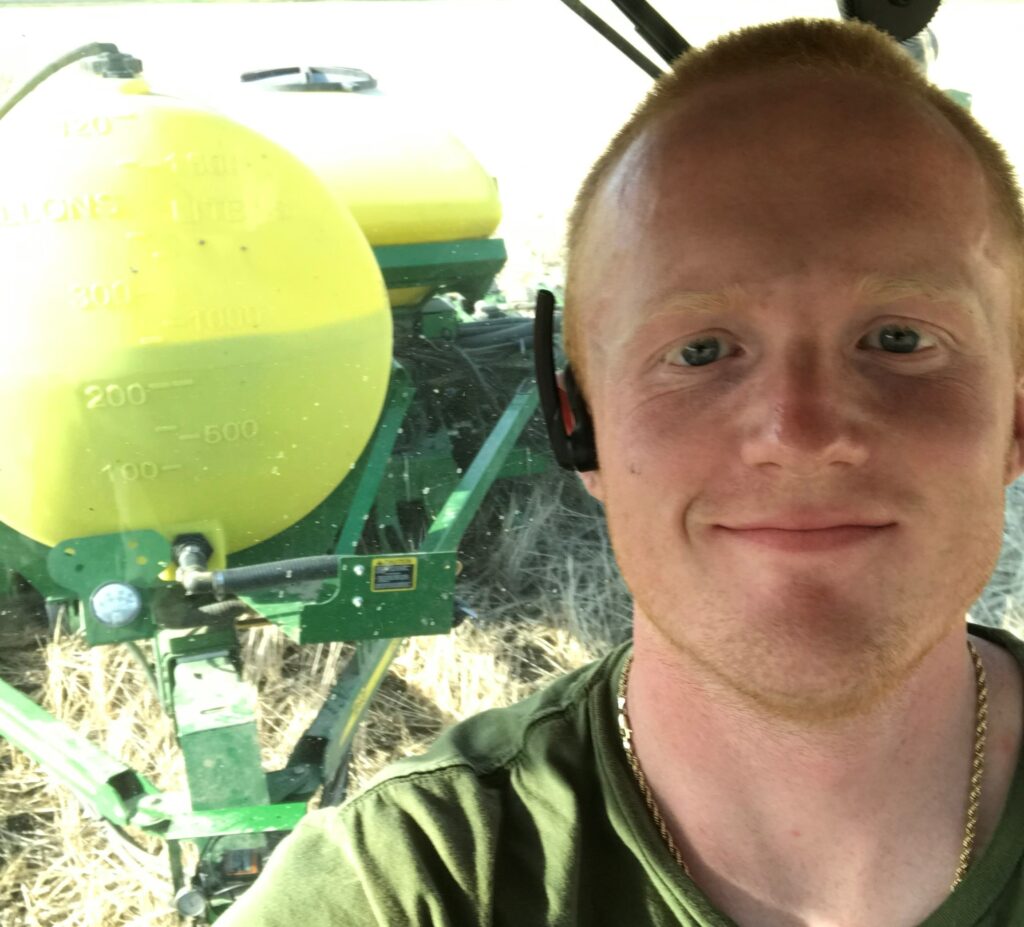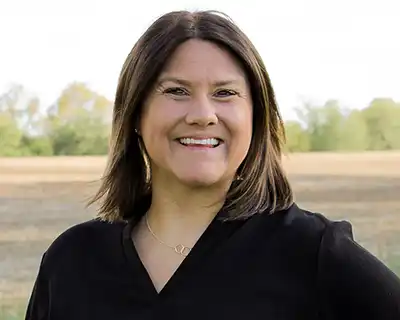Editor’s note: America’s Conservation Ag Movement has embraced farmer-to-farmer knowledge transfer as a key pillar in the strategy to accelerate regenerative ag practice adoption. At the center of the farmer learning communities, exceptional farmers have stepped forward to lead these efforts in their communities. These individuals are leaders in their own innovation and implementation of practices and programs that fit for their unique farm operation and help achieve the goal of continuous improvement. This profile is part of a series of that will highlight these Conservation Stewards, their farms, and their conservation practices throughout the year.
Aaron Krueger is a fourth-generation farmer in the southwest corner of Owensville, Indiana, where he manages 870 acres of corn, soybeans and soft red winter wheat with his grandfather. His conservation practices have created more resiliency on his land and reduced his input use just three years into implementation, and he’s got a plan to reap additional agronomic and financial rewards during his next phase of program changes in the coming years.
Trust In Food: How long have you been conducting conservation stewardship practices and programs? What impact have they had on your operations?
Krueger: My start began in the fall of 2015 when I planted my first cover crop on 20 acres after several discussions throughout the summer with a trusted mentor of mine. I dabbled on a small number of acres with covers then until I took over management of my family’s farm at the conclusion of the 2018 harvest. Ever since, we’ve kept everything covered, progressed into planting every acre green, and are beginning to utilize crimping on a larger scale. The impact, even in just 3 years since we’ve introduced some of these practices on a lot of our acres, is huge. We’ve been able to better withstand large rainfall events, cut back on some residual herbicide usage, and are on the cusp of beginning to run some trials to see if we can scale back our nitrogen program due to overall increased efficiency of our soil as a whole and the credit that our legume covers are giving us.
Trust In Food: What does the term “climate-smart agriculture” mean to you?
Krueger: “Climate-smart agriculture”, to me, is the utilization of conservation practices such as no-till and cover crops, to protect and preserve not just our soils, but the surrounding environments and ecosystems around our farms. Additionally, in my mind, it is centered around the idea of farming more as nature intended by minimizing disturbance, keeping a live growing plant/root year-round, armoring the soil, and increasing our diversity of species with plants and possibly animals in some cases.
Trust In Food: What would you consider your greatest achievements or strengths? What else do you want to accomplish in the next year?
Krueger: I’m still early in my farming career, so I haven’t necessarily done a whole lot yet. But I would have to say that my greatest achievement is that I’ve been able to make cover crops and planting green work well on our farm. It didn’t come overnight. It took several years of trying and experimenting and even failing. My greatest strength is that I’m not afraid to try something new. Rick Clark (fifth-generation farmer in Warren County), a well-known regenerative ag figure in the state of Indiana, always likes to emphasize that if you’re not doing something that makes you a least a little uncomfortable, then you’re not trying hard enough. I try to keep that in the back of my mind and push my limits each year. In the next year, I’m hoping to step outside of my comfort zone and become more involved and outspoken in the community. Hopefully, I’ll be able to help educate and open some eyes about the conservation ag movement.
Trust In Food: Have they had any agronomic impact? Financial impact?
Krueger: I have seen a definite agronomic and financial impact from the conservation practices which we have employed. One of the most notable and easily recognizable is the reduction in weed pressure since we’ve started using covers, specifically cereal rye. I have a hard time finding a horseweed (marestail) anymore, and at one time, we had plenty. With using rye, we’ve been able to cut out some residual herbicide passes and let the “mat” suppress weeds for us. Secondly, we have several fields that are flat and are a stickier silty clay loam texture in which water infiltration/ponding is a problem. Over the past 3 years the areas which drown out from excessive ponding are shrinking, slowly but surely. By maintaining a living root year-round, we’re “opening up” the soil up in a way that not even iron can. Additionally, we’ve mitigated one of the biggest no-till pests, slugs, by planting green. Since we’ve been planting green and delaying termination, we’ve not had any problems with slugs eating our soybeans.

Trust In Food: What other opportunities do you see on your farm or the farms around you?
Krueger: I see several opportunities. The emergence of carbon markets presents a unique opportunity for farmers to be able to capitalize on the practices which they’re utilizing. There seems to be a lot of momentum centered around these sorts of programs at the time being. The key will be to begin to understand the details and figure out which ones will work the best. Down the road, I’m interested in the possibility of integrating livestock back onto the farm. I think there is a huge opportunity to be able to work with a local cattle producer to gain dual benefits for both parties out of grazing cover crops.
Trust In Food: What state or local organizations have helped you in identifying opportunities or helped you implement practices and programs? What other organizations are you affiliated with?
Krueger: The local NRCS has been a huge help not only financially through several cost share programs that I’ve been able to utilize, but verbally, through their support and expertise. Additionally, I’ve had a ton of support and interest in what I’m doing from the Conservation Cropping Systems Initiative of Indiana (CCSI). Through CCSI, I’ve gotten the opportunity to be a part of the National Wildlife Foundation’s Conservation Champions group which has a vast network of farmers and outreach professionals. Now most recently, I have the great privilege of working as a farmer conservation steward with America’s Conservation Ag Movement.
Trust In Food: What advice would you give other farmers as they continue to consider climate-positive practices? Have you had any failures or lessons learned in your journey that you learned from? What would you do differently with what you know today?
Krueger: Be patient and stay within your comfort zone. All these practices take time. You may not see drastic changes year 1 but be diligent and stay patient and stay the course. Progress at your pace. With anything new, there is always a learning curve and a bit of hesitancy at first. I’ve taken several years to ease into a lot of the practices which I’m currently using. I’ve found the best thing to do is take a field and try something, and if it works, expand upon it. While we all may be headed in the same direction for the same goal, we don’t have to take the same exact paths there. Everyone’s farm is different, and you must find what works for you. I’ve had numerous failures over the years and learned from them. Each one has made my operation better. I wouldn’t change a thing with what I know now. All I’ve experienced has led me to where I am now, and I’m pleased with where I’m at currently and where I’m heading.



